Can Fertile Chicken Eggs Get Cold Then Warm Again
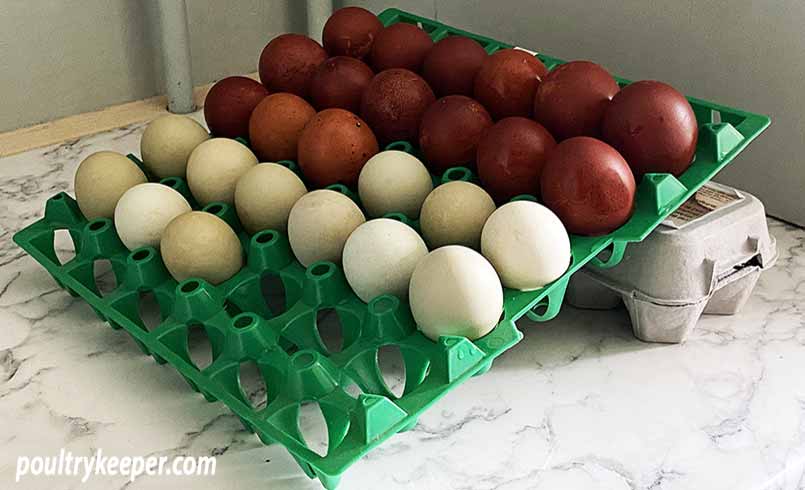
We oftentimes take great care of incubation, trying to get as many chicks to hatch every bit possible, but how much attention practise we give to getting the almost feasible eggs beforehand?
This article will tell you how to collect and store hatching eggs correctly before incubation using an incubator or broody hen.
Before we reach the time to collect and store hatching eggs, ready for incubation, there is some preparatory work we need to practise in the months running up to the breeding season.
Healthy parent stock
Healthy birds produce viable eggs—fertility and hatchability decline when hens become ill. Even poultry worms, for case, will cause problems with the number of viable eggs you can collect from your birds.
If you feed your birds a skillful diet, they will lay more fertile, viable eggs. Feeds with Omega three and vi fat acids volition back up loftier-quality sperm and eggs, while poly peptide provides essential amino acids and methionine, which helps proper egg development and aids hatchability.
Ideally, feed a specialised breeders ration for at to the lowest degree a couple of months before you lot intend to collect eggs for hatching.
Allowing birds to free-range with access to grass will also improve their wellness no terminate, merely information technology isn't a substitute for a balanced feed.
Finally, birds need admission to insoluble poultry grit to digest their food correctly, which should always be available to them ad-lib.
Vigour of a strain
The vigour and hatchability declines as birds become more than closely related. Close convenance is common with show birds; however, it's also common not to outcross besides frequently, or yous will soon lose particular looks and characteristics from your birds (quite speedily, in fact, in just 2 or 3 generations).
I started my flock of Cream Legbars from a trio of birds, and later eight years, both fertility and hatchability were low (less than 50%), so I outcrossed, introducing a new bloodline. The fertility immediately increased to over xc%, and the vigour of the chicks I was hatching made me realise how bad my hatchability had been.
Hygiene
Nest boxes should be as clean equally possible so that eggs get the least amount of soiling possible. For chickens, the main problem seems to be when hens sleep in nest boxes, messing in them overnight.
There are ways to overcome this: blocking off the nest boxes at dusk (a cardboard box the right size volition practice) to making nests darker, which encourages laying in the nestbox rather than elsewhere. I take establish the near straightforward technique is nailing an old feed bag over the entrance, with a few strips cut in it.
Hens may exist using nestboxes if in that location isn't enough perch space for them, or in some cases, if they are positioned higher than perches, I recommend you await out for this when researching chicken houses.
It's better not to have muddied eggs in the first place, but if yous observe y'all have some eggs that need cleaning, you can wash them with a piddling warm water mixed with a suitable egg sanitiser.
Still, heavily soiled eggs are better off left out of the incubator unless they are high value or in short supply.
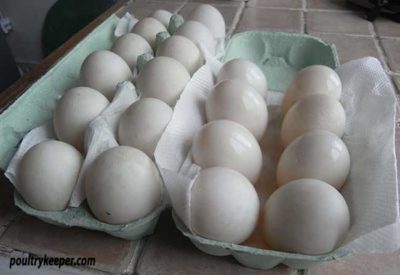
Keeping eggs clean with waterfowl can be difficult, simply if their nesting areas are kept clean, at that place is no reason why their eggs shouldn't be reasonably clean when y'all collect them.
Incubation
Disinfectant
Leaner multiply very quickly at incubation temperatures.
I use a biodegradable Incubation Sanitiser in tepid water to clean hatching eggs that are mucky.
This is effective against viruses, yeasts, fungi, and bacteria which tin damage the developing embryo.
A sanitiser is also useful for safely cleaning out your incubator after utilise.

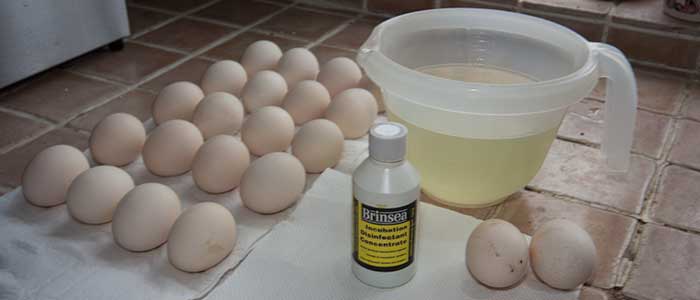
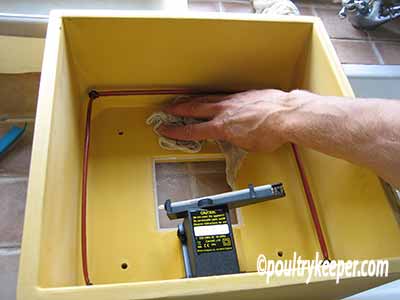
How to collect hatching eggs
Eggs should exist collected regularly – at least iii times per day. If the conditions is hot, this needs to be equally soon as possible subsequently laying. Broody hens should non be allowed and are improve removed from the run to sit down on dummy eggs until you are set or taken out and 'broken' from their broodiness.
Any small increase in temperature can start incubation which will be a problem for storing them for any reasonable time.
Shape and size
Although it'southward tempting to incubate the largest eggs your hens lay, average size eggs are more likely to hatch. Just collect eggs that are the right shape. Eggs that are likewise round or pointed do non provide the correct environment for the embryo to develop.
How to store hatching eggs
Storing hatching eggs is a natural office of the incubation process. A hen will select a suitable site for a nest and gradually build up a clutch of eggs before incubating them.
We can similarly store hatching eggs, finding a suitable location at home where information technology'south not too warm and get together enough eggs to incubate.
Shop eggs pointed cease down to go on the yolks centred within the albumen. Utilize clean egg trays or in egg boxes in a cool, dark room or cupboard. Try to avert places that have temperature fluctuation or sunlight coming in through a window.
If eggs demand cleaning, and so use an incubation disinfectant/sanitiser diluted with tepid h2o at the right charge per unit.
- For storage upward to seven days, 15 to 18°C and 75% humidity is recommended.
- For storage longer than 7 days, 10 to 12°C and 85% humidity is recommended.
Egg turning
But like we plow eggs in the incubator, we need to plow eggs that are stored for longer than a couple of days to stop the yolks from sticking to one side of the beat out.
It is easier than it sounds. Tilt your eggs 45 degrees by elevating 1 end of the egg box or tray. Drag the opposite end the side by side 24-hour interval.
How long tin can hatching eggs be stored?
You can shop hatching eggs for up to two, even three weeks without whatsoever noticeable deterioration in the hatch charge per unit under the correct atmospheric condition.
Getting the right storage conditions (10-12°C) for this length of time without purchasing specialist equipment is ordinarily the problem for a back garden poultry keeper (see my solution with a DIY egg fridge below).
Keeping hatching eggs for up to a week at 15-18°C is more than manageable, so this tends to exist a rule of thumb for a backyard flock. A humidity of 75% can be challenging in dry climates. Adding trays of h2o to the storage closet or room can increase the moisture content of the air.
DIY egg fridge for hatching eggs
About of u.s. don't want to pay for a temperature-controlled environmental unit of measurement to store hatching eggs for an extended period.
Even set to the warmest setting, a refrigerator usually gives temperatures of around v°C, which is also cold for storing hatching eggs.
I came upward with one solution to fit egg trays into an sometime fridge, then use a thermostatically controlled relay socket to turn it on and off to maintain the correct temperature range.
The Inkbird ITC-308 Digital Thermostat plugs into the mains, and the temperature probe is placed in the fridge well-nigh the eggs.
It has two sockets—one to control heating and the other, cooling. Providing the outside air temperature is above the desired temperature range, in that location is no need to use a heater.
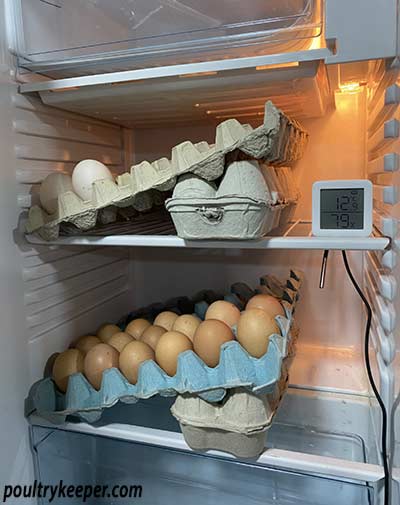
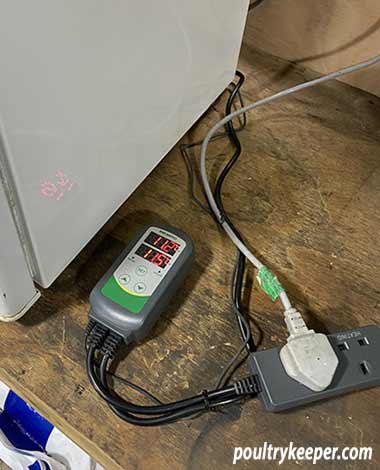
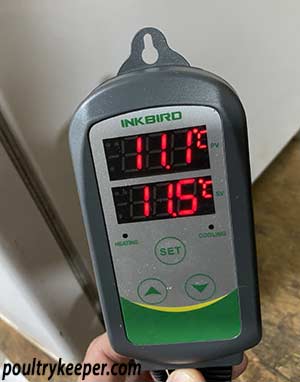
Plug the fridge into the cooling socket and set the desired temperature. At that place is a setting for when the cooling turns back on over again, and so information technology isn't constantly switching the refrigerator's compressor on and off.
To increase humidity, y'all can add a tray of water that will slowly evaporate, increasing the air's humidity. I identify containers in the fridge door.
Incubation 24-hour interval
When you are fix to incubate, if your hatching eggs are stored at a absurd temperature, they will gradually come upward to room temperature if you give them sufficient time.
In that location is more information in this article if y'all are hatching eggs nether a broody hen.
If you lot are hatching artificially, your incubator needs to be running at to the lowest degree 24 hours beforehand.
Often, the incubator humidity is where there are the most bug. I covered measuring and checking relative humidity in incubators in this guide extensively.
Good luck with your incubation. I hope you now know how to collect and shop hatching eggs to become the best results from your hatch.
Source: https://poultrykeeper.com/incubation-brooding/storing-hatching-eggs/
Enviar um comentário for "Can Fertile Chicken Eggs Get Cold Then Warm Again"